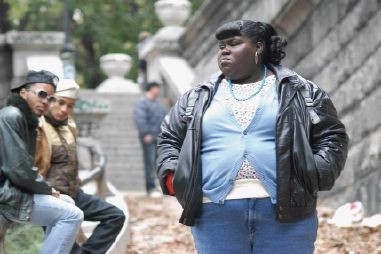Precious

The trailers for Precious suggest a weepy after-school special. But the movie itself turns out to be an honest piece of work—gritty, unsentimental and unconventional.
The unwieldly full title Precious: Based on the Novel Push by Sapphire is the movie’s biggest flaw. Precious (Gabourey Sidibe) is an overweight, under achieving 16-year-old girl whose mother, Mary (Mo’Nique), beats and verbally abuses her.
Mary’s seldom-abated fury is the result of sexual jealousy: Precious’s father, whom we never see, has been raping the girl since she was three and has recently impregnated her for the second time. Precious’s daughter has Down syndrome and lives with Mary’s mother, who only brings her by when the social worker comes to check on the family. When the principal at the school Precious attends—where she stays in the back row, mostly silent—recommends her for an alternative program, Precious has to combat Mary’s anger and mockery to enroll.
The material is full of traps, but screenwriter Geoffrey Fletcher and director Lee Daniels avoid almost all of them through tonal variety and stylistic inventiveness. Daniels works from Precious’s point of view, showing us what’s going on in her head: how she deals with the grimness of her life using her rich, witty, pop-culture-fed imagination. She sees herself as a movie star at a premiere, a model on a shoot; when she peeps into a church and sees a choir rehearsing, she envisions herself as one of the singers. She looks at herself in the mirror before leaving the house, and a well-dressed white girl grins back at her.
In one of these interludes, Precious’s mother falls asleep in front of the eternally blinking TV, which is showing Vittorio De Sica’s Two Women. Precious places Mary and herself in the film, in the mother and daughter roles. The story of women raped during wartime echoes her situation, while the loving relationship between Sophia Loren’s and Eleonora Brown’s characters provides an ironic juxtaposition to her own with her mother.
Precious is both a coming-of-age narrative and a triumph-of-the-spirit movie. The girl finds a mentor in a warmhearted teacher, Blu Rain (Paula Patton), and an advocate in Mrs. Weiss (Mariah Carey), a caseworker at the welfare office. And she finds friends in her new class among the sassy, plainspoken girls.
Daniels mines a great deal of humor out of the classroom scenes, encouraging the talented young actresses to improvise and then shaping their interactions with understated skill. He’s a marvelous acting coach: the contrasting styles of the four major actresses play off each other in a way that broadens the movie’s emotional landscape. Patton is soulful, Carey wised-up, but both underscore the sympathetic and pragmatic aspects of their characters.
As for Sidibe, she’s a genuine find. The trick for an actor in this role is to convey both the girl’s toughness—Precious tells off the local crack dealers and knocks down a randy boy who gets too close—and what’s hiding beneath it. Sidibe’s big face looks closed, but there are currents of feeling running through it. And though she barely opens her mouth when she talks, the voice you hear when she narrates her thoughts is soft and surprisingly delicate.
The most extraordinary performance comes from Mo’Nique. Mary’s treatment of her daughter is so cruel that it would be easy simply to make her a villain. But the actress/comedian instead suggests how Mary’s attacks on Precious are linked to her despair at her own emotional paralysis. When Precious leaves her mother for good and Mary is trying to get her and her newborn back, Mrs. Weiss arranges a meeting in her office and confronts Mary with the abuse Precious has suffered in her home. Mary responds with a confession that’s staggering in its intimacy and anguish.
The movie contains only one predictable scene, when Precious returns to Ms. Rain’s class after receiving bitter news. Otherwise it’s a continual surprise—by turns tender and raucous, realistic and poetic.





